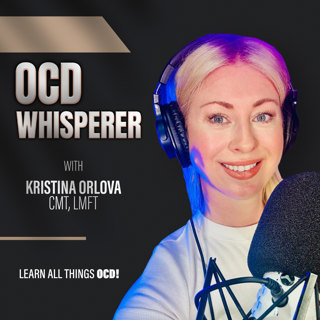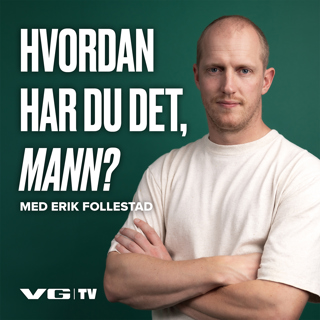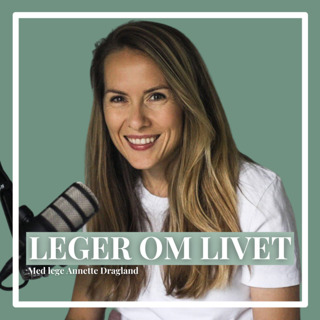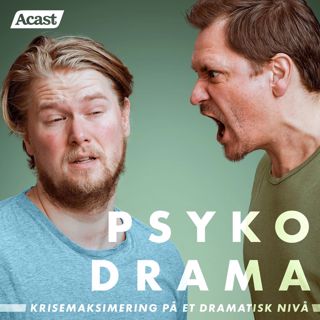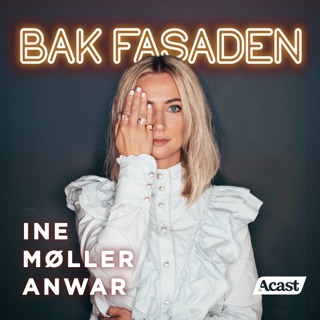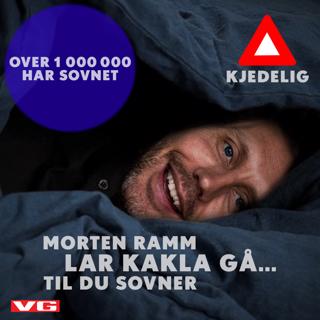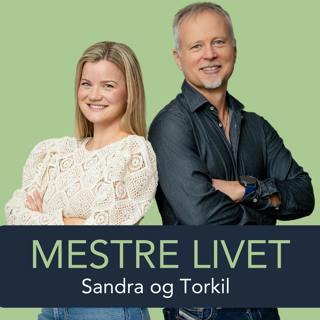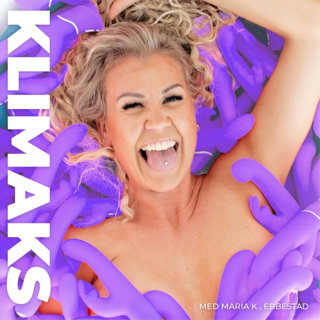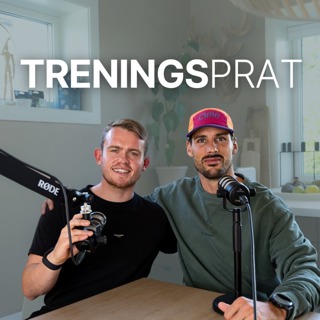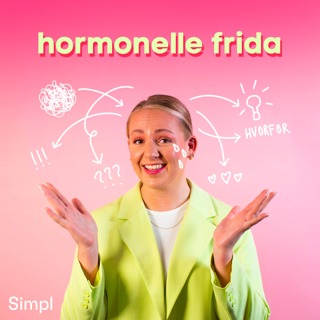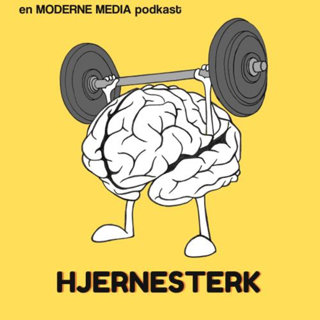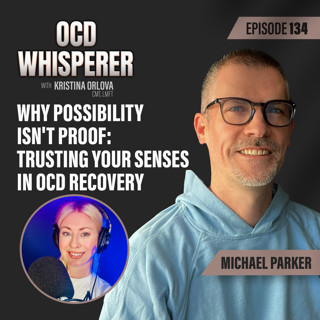
134. Why Possibility Isn’t Proof: Trusting Your Senses in OCD Recovery with Michael Parker
You wash your hands… but did you really get them clean? You wiped down the package… but what if something invisible is still there? You tell yourself it’s fine, yet your brain won’t let it go. If that sounds familiar, you’re not alone. In this episode of the OCD Whisperer Podcast, Kristina Orlova welcomes back Mike Parker, licensed clinical social worker and creator of the OCD Space YouTube channel, to explore the obsessive doubt that drives contamination fears—and the path out of its grip. Together, they dive into the complexities of inference-based cognitive behavioral therapy (ICBT) and how it helps those with OCD step out of fear-driven reasoning and back into reality. But how do you convince your mind to trust your senses when OCD keeps whispering “what if”? Whether it’s worries about unseen germs on a park bench, contamination from a package, or the lingering fear of harming others through inaction, this conversation lays it bare. Mike and Kristina break down the difference between healthy caution and compulsive checking, and why the way we reason matters just as much as the content of our fears. They explore how OCD hijacks imagination and certainty, and why choosing functional certainty—the decision to act as if you’re okay unless proven otherwise—can be a powerful turning point. Can you learn to trust your senses again? Or will your imagination keep calling the shots? Tune in and find out—this might just change how you see everything… especially what you can’t see. Let's dive in! In This Episode [00:00:03] Introduction to the episode [00:00:53] Understanding ICBT [00:01:08] Discussion on contamination fears [00:02:13] Addressing invisible threats [00:03:04] Grounding in reality [00:06:37] Healthy reasoning vs. OCD reasoning [00:10:21] Living with possibility [00:12:06] Inferential confusion in OCD [00:13:33] Constantly thinking about the unseen [00:14:24] Helping clients recognize reality [00:15:29] The challenge of OCD as a competitor [00:16:50] Understanding reality and OCD [00:18:48] Trust and perception [00:19:30] Reality sensing in CBT [00:20:43] Behavioral change and CBT [00:21:58] Individualized treatment approaches [00:23:01] Possibility vs. sensory information [00:24:02] Relying on senses [00:24:25] Closing remarks and resources Notable Quotes [03:04] "It's true our senses can't detect certain things, but we have ways of dealing with that. They're already established, you know, as far as hand washing routines or, you know, if it's a religious situation, how much you should pray, what rituals you should do." — Mike Parker [06:06] "Healthy reasoning is like, okay, I know the limitations of my senses. I know what information I have available, and then ultimately I'm gonna make that decision based on that." — Mike Parker [07:07] "If you really want to sit on park benches and stop doing that. Let's realize you don't have to actually concern yourself with what you can't." — Mike Parker [15:59] "So, right, what you're telling me basically, is you're walking down the street and you have no visible poop on you, and you don't smell poop on you, and you're thinking about poop. We gotta figure out what's going on there, because you don't do that anywhere else in life." — Mike Parker [21:58] "I’m open about my OCD. There’s still a certain way I thought, and next thing you know, you’re right back in this anxious state that just feels horrendous.'." — Kristina [23:12] "Even in an area where your senses can't detect anything, the reasonable, rational way to live is to do that functional certainty thing and just to assume you're okay." — Mike Parker Our Guest Mike Parker, LCSW, is a licensed clinical social worker and private practice therapist based in Pittsburgh, Pennsylvania. He specializes in treating obsessive-compulsive disorder (OCD) using cognitive-behavioral therapy (CBT) and inference-based cognitive therapy (I-CBT). As the host of the OCD Space YouTube channel, Mike is dedicated to educating individuals and mental health professionals on effective OCD treatment approaches. He is passionate about helping clients understand and overcome obsessional doubt while also training fellow therapists in evidence-based interventions. With a focus on empowering individuals to trust themselves and break free from the cycle of compulsions, Mike continues to be a leading voice in the OCD treatment community. Resources & Links Kristina Orlova, LMFT Instagram YouTube OCD CBT Journal Tracker and Planner Website Mike Parker Website LinkedIn YouTube Mentioned Cognitive Therapy for OCD I-CBT Training Online Sneaky Rituals with Jenna Overbaugh (https://www.korresults.com/sneakyrituals) ICBT with Kristina Orlova and Christina Ennabe (https://www.korresults.com/icbtmasterclass) Disclaimer Please note, while our host is a licensed marriage and family therapist specializing in OCD and anxiety disorders in the state of California, this podcast is for educational purposes only and should not be considered a substitute for therapy. Stay tuned for bi-weekly episodes filled with valuable insights and tips for managing OCD and anxiety. And remember, keep going in the meantime. See you in the next episode!
29 Apr 25min
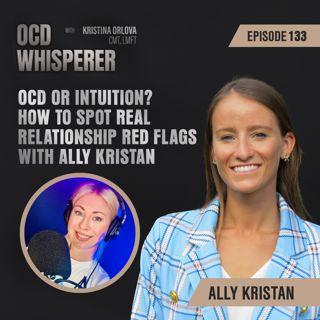
133. OCD or Intuition? How to Spot Real Relationship Red Flags with Ally Kristan
There’s a quiet tension in love when you live with OCD—an unshakable feeling that something’s off, followed by crushing doubt: Is this real, or is it just my disorder? You learn to second-guess yourself, to dismiss your instincts, to stay in places that feel unsafe because your brain tells you fear is always a lie. But what if it isn’t? In this episode of The OCD Whisperer Podcast, host Kristina Orlova talks with marine biologist, Antarctic researcher, and Braving the Waves author Ally Kristan about the dangerous intersection of OCD and relationships. Diagnosed at 12, Ally knows how OCD can distort reality—how you can mistake manipulation for reassurance, red flags for intrusive thoughts, and chaos for normalcy. Together, they explore the heart of the dilemma: How do you trust yourself when your mind has betrayed you before? OCD doesn’t just invent fears—it can bury real ones, conditioning you to ignore the quiet voice that says, This isn’t right. They unpack how manipulative partners exploit OCD’s vulnerabilities—love bombing, gaslighting, instability disguised as passion. And they offer a counterpoint: what safe, steady love can actually feel like. This episode isn’t just insight—it’s an invitation. To stop gaslighting yourself. To reclaim your instincts. To step into relationships that feel like peace instead of war. The question isn’t can you trust yourself again. It’s: are you ready to try? Let’s get into it! In This Episode [00:03] Introduction to Ally Kristan [01:00] Understanding OCD's impact [01:24] Distinguishing intrusive thoughts [02:32] Toxic relationships and therapy [04:48] Recognizing red flags [05:38] Love bombing explained [09:29] Gaslighting and its effects [10:12] Identifying healthy relationships [14:22] The role of reassurance in relationships [15:05] Navigating compulsive behaviors [16:18] Understanding relationship dynamics [16:46] Understanding OCD and relationships [17:10] Healthy relationship dynamics [18:07] Identifying toxic traits [18:54] Consistency in relationships [20:01] Evaluating relationship feelings [20:32] Comparing friendships to relationships [22:18] Good days vs. bad days [22:56] Rebuilding trust in instincts [23:21] Meditation for clarity [26:43] Nature as a healing tool [27:13] Finding the right meditation [28:32] Time and practice for intuition [29:20] Differentiating symptoms [32:03] Closing thoughts and Ally’s resources Notable Quotes [02:09] “It is really difficult to know the difference between the OCD noise and something that your gut instinct is telling you, especially in relationships." — Ally [06:52] "Love bombing is definitely something to look out for, especially if it's somebody pursuing you who you're not initially interested in. That should be a little bit of a red flag." — Ally [08:42] "When you're with someone who does truly love you and have your best interest at heart, they're going to make it feel like loving you is easier than breathing." — Ally [09:37] "Gaslighting is when somebody is basically making you doubt your own sense of reality." — Ally [17:47] "I really do believe that if you're with somebody who's really making you safe and really does have your best interest at heart, it's not going to exacerbate your OCD symptoms." — Ally [28:40] "Trying to regain touch with your own intuition and mind again, it takes time and practice and consistency, but once you get there, it's like the floodgates are open and such a sense of restored peace." — Ally Our Guest Ally Kristan is a marine biologist, wildlife advocate, and author of Braving the Waves, a memoir exploring her journey with OCD and toxic relationships. Her work has been featured in National Geographic, NPR, and Audubon Magazine. Through speaking engagements and her Instagram (@UpYourAlly), Ally empowers others to reclaim self-trust and navigate mental health challenges with resilience. Resources & Links Kristina Orlova, LMFT Instagram YouTube OCD CBT Journal Tracker and Planner Website Ally Kristan Website Instagram Book Disclaimer Please note, while our host is a licensed marriage and family therapist specializing in OCD and anxiety disorders in the state of California, this podcast is for educational purposes only and should not be considered a substitute for therapy. Stay tuned for bi-weekly episodes filled with valuable insights and tips for managing OCD and anxiety. And remember, keep going in the meantime. See you in the next episode!
15 Apr 34min
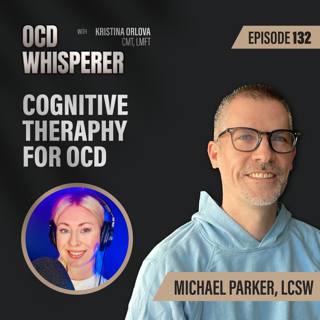
132. Cognitive Therapy for OCD
In this riveting episode of the OCD Whisperer podcast, host Kristina Orlova sits down with Mike Parker, a licensed clinical social worker and the creator of the popular YouTube channel OCD Space. Together, they embark on a deep dive into the world of OCD and the transformative power of Inference based cognitive-behavioral therapy (ICBT). But what happens when doubt becomes the driving force behind every thought? And how can someone trapped in the cycle of obsessional doubt ever learn to trust their own mind again? Mike Parker pulls back the curtain on the insidious nature of "obsessional doubt," a phenomenon that leaves individuals questioning their every thought, memory, and perception. Why do those with OCD feel compelled to seek reassurance over and over, even when they know it offers only fleeting relief? And how does this relentless doubt keep them locked in a prison of their own mind? As the conversation deepens, Kristina and Mike explore the critical differences between ICBT and exposure and response prevention (ERP). But here’s the burning question: Can understanding the origin of obsessive thoughts be the key to breaking free from their grip? Mike sheds light on how inferential confusion and obsessional doubt drive OCD. This episode is a masterclass in navigating the labyrinth of OCD treatment. Will listeners walk away with a newfound understanding of how to confront their doubts? Or will the complexities of the human mind leave them questioning everything they thought they knew? Tune in to uncover the answers—and perhaps, a path to freedom. In This Episode [00:02] Introduction to the episode [00:56] Understanding ICBT [02:00] Obsessional doubt explained [02:21] Differentiating ICBT from ERP [03:36] The nature of obsessional doubt [05:58] Reassurance-seeking behavior [09:25] Understanding internal evidence [11:27] The role of self-knowledge [13:31] General facts vs. personal context [14:49] Handling real mistakes [16:40] Exploring early memories [17:46] Understanding obsessional doubt [19:22] Childhood influences on OCD [20:28] Clarifying ICBT vs. psychodynamic therapy [21:44] Focus of inference-based CBT [22:41] Cognitive distortions in OCD [25:34] Re-evaluating daily routines [27:06] Timeframe for progress in treatment [29:22] Complicating factors in OCD treatment Notable Quotes [00:02:42] "Obsessional doubt is a core process identified in OCD when you’re doing I-CBT. It’s a thought process where someone with OCD knows something but doesn’t trust themselves enough to stick with what they know, leading them to question, dismiss, and seek more information than they have." - Michael Parker [00:18:26] "We can start to see how long the client has been telling themselves an obsessional story about themselves... It was all logged in there and then all put together, but if we go back, we can see this actually never meant you should be locked into never-ending doubt." - Michael Parker [00:23:39]"I-CBT is primarily a cognitive therapy... The focus really is figuring out why you reject information, why you don't trust it... Let's figure out why you doubted." — Michael Parker Our Guest Mike Parker, LCSW, is a licensed clinical social worker and private practice therapist based in Pittsburgh, Pennsylvania. He specializes in treating obsessive-compulsive disorder (OCD) using cognitive-behavioral therapy (CBT) and inference-based cognitive therapy (I-CBT). As the host of the OCD Space YouTube channel, Mike is dedicated to educating individuals and mental health professionals on effective OCD treatment approaches. He is passionate about helping clients understand and overcome obsessional doubt while also training fellow therapists in evidence-based interventions. With a focus on empowering individuals to trust themselves and break free from the cycle of compulsions, Mike continues to be a leading voice in the OCD treatment community. Resources & Links Kristina Orlova, LMFT Instagram YouTube OCD CBT Journal Tracker and Planner Website Mike Parker Website LinkedIn YouTube Cognitive Therapy for OCD Disclaimer Please note, while our host is a licensed marriage and family therapist specializing in OCD and anxiety disorders in the state of California, this podcast is for educational purposes only and should not be considered a substitute for therapy. Stay tuned for bi-weekly episodes filled with valuable insights and tips for managing OCD and anxiety. And remember, keep going in the meantime. See you in the next episode!
1 Apr 31min
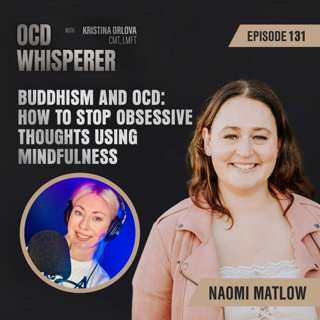
131. Buddhism and OCD: How to Stop Obsessive Thoughts Using Mindfulness
Imagine struggling with intrusive thoughts that feel unbearable, unshakable, and all-consuming. You try to fight them, suppress them, or rationalize them away, only to find that they persist, growing stronger with every attempt to resist. But what if the key to managing OCD wasn’t in pushing these thoughts away, but rather in changing your relationship with them? In this thought-provoking episode of The OCD Whisperer Podcast, host Kristina Orlova, LMFT, welcomes Naomi Matlow, a writer, educator, and OCD advocate, to explore how Buddhist psychology offers a fresh perspective on OCD management. Naomi, the author of A Thought is Just a Thought: A Buddhist Guide to OCD, shares how ancient Buddhist teachings on mindfulness, suffering, and attachment can help individuals with OCD develop a new understanding of intrusive thoughts. Together, Kristina and Naomi dive deep into the nature of suffering, the role of acceptance, and practical techniques for navigating intrusive thoughts without letting them define you. This episode is a must-listen for anyone looking to integrate mindfulness-based approaches into their OCD recovery journey. In This Episode [00:00:00] Introduction to the episode [00:01:04] Naomi’s background and inspiration for writing her book [00:02:33] Understanding OCD through a Buddhist lens [00:04:03] How thoughts are like sensory perceptions [00:05:41] The Western tendency to over-identify with thoughts [00:07:12] The challenge of accepting intrusive thoughts [00:09:56] Clinging, aversion, and the roots of suffering in OCD [00:11:20] The Four Noble Truths and how they relate to OCD [00:13:20] The role of desire and resistance in maintaining suffering [00:16:29] Practical steps to cultivate acceptance and detachment [00:18:35] Shifting focus from thoughts to sensory experiences [00:20:45] Meditation techniques for intrusive thoughts [00:22:14] How to connect with Naomi [00:22:54] Closing remarks Notable Quotes [00:13:00] "An OCD thought is a thought you are not willing to have." – Naomi Matlow [00:07:12] "We tend to put so much weight on the content of our thoughts, but thoughts are just another form of perception—like smelling something bad in the fridge. They don’t define who we are." – Naomi Matlow [00:11:20] "Clinging to positive experiences or pushing away negative ones only deepens suffering. Acceptance isn’t about approval—it’s about allowing reality to be what it is." – Naomi Matlow [00:25:00] "The body is always in the present moment, but the mind is often stuck in the past or worried about the future. That’s why grounding in the senses can be so powerful." – Naomi Matlow Our Guest Naomi Matlow is a writer, educator, and OCD advocate based in Southern California. In 2024, she published her creative thesis from Lesley University's Mindfulness Studies Master’s program, which evolved into A Thought is Just a Thought: A Buddhist Guide to OCD. Naomi’s work integrates Buddhist philosophy, mindfulness, and evidence-based OCD treatment approaches to help individuals develop a healthier relationship with their thoughts. Resources & Links Kristina Orlova, LMFT Instagram YouTube OCD CBT Journal Tracker and Planner Website Naomi Matlow Instagram Website Mentioned in This Episode: A Thought is Just a Thought: A Buddhist Guide to OCD by Naomi Matlow ICBT with Kristina Orlova and Christina Ennabe Sneaky Rituals with Jenna Overbaugh Disclaimer Please note while our host is a licensed marriage and family therapist specializing in OCD and anxiety disorders in the state of California, this podcast is for educational purposes only and should not be considered a substitute for therapy. Stay tuned for biweekly episodes filled with valuable insights and tips for managing OCD and anxiety. And remember, keep going in the meantime. See you in the next episode!
18 Mar 26min
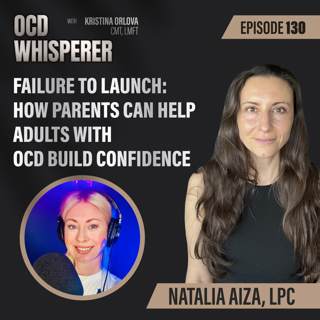
130. Failure to Launch: How Parents Can Help Adults with OCD Build Confidence
Imagine this: A bright, capable adult, full of potential, yet paralyzed by the invisible grip of OCD. They live at home, rely on their parents for everything, and seem unable to take the first step toward independence. The parents, heartbroken and exhausted, wonder, “Where did we go wrong? How do we help without hurting?” It’s a delicate dance, a tightrope walk between support and enabling, between love and letting go. In this compelling episode of The OCD Whisperer Podcast, host Kristina Orlova, LMFT, welcomes Natalia Aiza, LPC, co-founder of Kairos Wellness Collective, for an insightful discussion on the challenges of "failure to launch" among adults with OCD. Together, they explore the complexities of dependency, the role of parental accommodations, and actionable strategies to help individuals with OCD take meaningful steps toward autonomy. Natalia shares her expertise on fostering independence through gradual, supportive approaches while emphasizing the importance of real-world exposure, skill-building, and overcoming the mental barriers that OCD creates. This episode is a must-listen for parents, caregivers, and individuals navigating the journey toward self-reliance. In This Episode [00:00:02] Introduction to the episode [00:01:04] Understanding "failure to launch" [00:02:33] Dependency and OCD [00:04:03] Parental guidance for adult children [00:05:41] Research on dependency [00:07:12] Creating independence plans [00:08:53] Challenges of financial independence [00:09:56] Motivation and comfort zones [00:12:41] Gradual process of change [00:13:20] Long-term parenting goals [00:14:49] Overcoming anticipatory anxiety [00:16:29] Learning new skills [00:18:35] Real-world exposure through jobs [00:19:27] Understanding OCD's impact on progress [00:20:45] The importance of financial independence [00:21:34] Rethinking personal rationalizations [00:21:45] Taking action against OCD [00:22:14] How to connect with Natalia [00:22:54] Closing remarks Notable Quotes [00:03:23] "I have certainly encountered so many families over the years of just practicing and myself treating OCD patients, and a lot of times there is a lot of conversation from family and parents especially of like, what do I do? How do I help?" - Kristina Orlova [00:11:20] "My job is to prepare my children for when I die. If I'm not preparing my children to live on and thrive when I am no longer here, then I am not fulfilling my purpose as a parent." - Natalia Aiza [00:16:29] "Most of the time with OCD, we really have to feel worse before we feel better, and I just want to normalize that feeling of dislike for the process because it is a hard, formative challenge." - Natalia Aiza [00:19:27] "OCD will try to interrupt and get in the way of any progress you are making, and the key is to respect the structure because the structure will immediately give you feedback, and it's feedback that hurts." - Natalia Aiza [00:20:45] "Human beings are notorious for mental gymnastics. We can create so many rationalizations for why not to do something, so it's really important to pause and relook at your own thought process." - Kristina Orlova [00:21:45] "OCD wants us in our heads, feeling like we can think our way out of it, but we can't. Only change and real-world experiences shake up your belief system." - Natalia Aiza Our Guest Natalia Aniela Aíza, LPC, is the founder and executive director of Kairos Wellness Collective, a leading OCD clinic based in Boulder, Colorado. A Harvard graduate and daughter of a political refugee, Natalia brings a unique perspective to mental health care, shaped by her multicultural background and fluency in multiple languages. With a career dedicated to serving diverse communities—including Latinx populations and medically complex children—Natalia is a passionate advocate for social justice and expanding access to effective OCD treatment. Under her leadership, Kairos Wellness Collective has helped over 2,000 clients across four locations. Natalia is also a writer, speaker, and advocate committed to improving mental health care and practitioner competency. Resources & Links Kristina Orlova, LMFT https://www.instagram.com/ocdwhisperer/ https://www.youtube.com/c/OCDWhispererChannel https://www.korresults.com/ https://a.co/d/fMT6vte Natalia Aiza https://www.kairoswellnesscollective.com/natalia-aiza https://www.linkedin.com/in/natalia-a%C3%ADza-0a1615174 https://www.instagram.com/letstalk.ocd/ Mentioned Sneaky Rituals with Jenna Overbaugh ICBT with Kristina Orlova and Christina Ennabe OCD CBT Journal Tracker and Planner Disclaimer Please note while our host is a licensed marriage and family therapist specializing in OCD and anxiety disorders in the state of California, this podcast is for educational purposes only and should not be considered a substitute for therapy. Stay tuned for biweekly episodes filled with valuable insights and tips for managing OCD and anxiety. And remember, keep going in the meantime. See you in the next episode!
4 Mar 23min
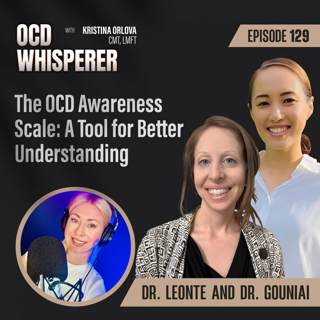
129. The OCD Awareness Scale: A Tool for Better Understanding
How well do we really understand the full spectrum of OCD? Many people—including professionals—struggle to recognize the various ways OCD can manifest beyond the commonly known themes. In this episode of The OCD Whisperer Podcast, host Kristina Orlova welcomes Dr. Kimberly Glazier Leonte, PhD and Dr. Jacquelin Gouniai, PsyD, LPC, co-founders of The OCD Academy. They introduce the OCD Awareness Scale, a new tool designed to bridge the gap in OCD education by providing a more comprehensive look at the disorder's many forms. Dr. Leonte and Dr. Gouniai discuss their professional experiences with OCD, the challenges of misdiagnosis, and the importance of increasing awareness for individuals, loved ones, and professionals. Dr. Gouniai also shares about her personal experience with OCD. The conversation highlights how their research has led to a scale that not only validates individual experiences but also helps guide effective treatment. Whether you're seeking to understand your own OCD, support a loved one, or improve clinical awareness, this episode provides valuable insights into the ever-evolving landscape of OCD research and treatment. Tune in to discover how the OCD Awareness Scale can help uncover the hidden dimensions of OCD. In This Episode: [00:00:03] Introduction to the OCD Whisperer Podcast [00:01:02] Meet the Guests: Dr. Kimberly Glazier Leonte & Dr. Jacquelin Gouniai [00:02:16] Why OCD Is So Commonly Misdiagnosed [00:03:45] The Role of Research in Expanding OCD Awareness [00:05:32] What Is the OCD Awareness Scale? [00:07:10] Breaking the Stigma: Recognizing Lesser-Known OCD Themes [00:09:05] How the Scale Helps Individuals with OCD [00:10:45] Using the Scale for Loved Ones and Caregivers [00:12:25] How Clinicians Can Use the Scale for Better Diagnosis [00:14:30] OCD in Children: Can Parents Use the Scale? [00:16:00] Jacquelin's Personal Journey with OCD and Misdiagnosis [00:18:20] The Global Need for OCD Education and Accessible Resources [00:20:15] Where to Find the OCD Awareness Scale [00:22:00] Final Thoughts and Resources for Listeners Notable Quotes: "OCD can really latch onto anything. One of our goals was to create a tool that truly represents the full range of OCD themes and examples, so more people can recognize themselves in it." – Dr. Kimberly Glazier Leonte "If someone doesn’t see their symptoms listed in a standard assessment, they might think they don’t have OCD at all. Our hope is to make the diagnosis process more inclusive and accessible." – Dr. Jacquelin Gouniai "So many people go to primary care doctors or religious leaders first for help, and unfortunately, many don’t recognize OCD when they see it. This scale can help bridge that gap." – Dr. Jacquelin Gouniai "I didn’t think I had OCD because I wasn’t washing my hands all the time. It took me years to realize my intrusive thoughts and rumination were classic OCD." – Kristina Orlova Our Guests: Dr. Kimberly Glazier Leonte, PhD Kimberly is a clinical psychologist and co-founder of The OCD Academy. She specializes in OCD research, treatment, and education, focusing on increasing awareness of underrepresented OCD themes. Her research at McLean Hospital helped shape the OCD Awareness Scale, a tool designed to improve identification and treatment. Dr. Jacquelin Gouniai, PsyD, LPC Jacquelin is a licensed clinical psychologist and co-founder of The OCD Academy. With firsthand experience navigating OCD misdiagnosis, she is passionate about increasing OCD education, especially in underserved areas like Guam. Her work aims to improve access to proper OCD treatment and reduce stigma. Resources & Links Kristina Orlova, LMFT https://www.instagram.com/ocdwhisperer/ https://www.youtube.com/c/OCDWhispererChannel https://www.korresults.com/ https://a.co/d/fMT6vte The OCD Academy https://www.instagram.com/the_ocd_academy/ https://www.theocdacademy.com/?fbclid=PAZXh0bgNhZW0CMTEAAaYWgau435BgPIf0DxZjW6e1kpldpTXf_wNo3bH3Cqh535Z2AtQe6NpSO8c_aem_q6OtBUV2jTmpxx4gLnOQyg Disclaimer Please note while our host is a licensed marriage and family therapist specializing in OCD and anxiety disorders in the state of California, this podcast is for educational purposes only and should not be considered a substitute for therapy. Stay tuned for biweekly episodes filled with valuable insights and tips for managing OCD and anxiety. And remember, keep going in the meantime. See you in the next episode!
18 Feb 27min
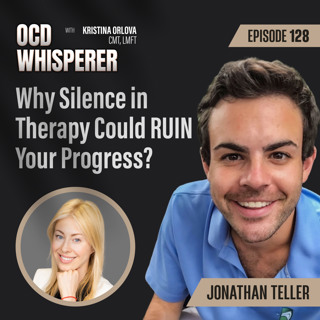
128. Why Staying Silent in Therapy Is Costing You More Than You Think
Many people struggle to speak up about their mental health needs, even when their treatment isn’t working. Why does self-advocacy feel so daunting? In this episode of The OCD Whisperer Podcast, host Kristina Orlova welcomes Jonathan Teller, a third-year clinical psychology PhD student at Northern Illinois University. Together, they explore the challenges of self-advocacy in healthcare and why it’s such an important skill for navigating mental health treatment. Jonathan shares thoughtful insights on overcoming barriers like fear of judgment or limited resources. From writing down concerns before appointments to involving trusted loved ones in therapy sessions, he offers practical strategies for making your voice heard. If accessing care feels out of reach due to financial or geographical limitations, they discuss creative solutions like self-study tools, free resources, and online communities. They also dig into the bigger picture: why treatment is just the beginning of the journey and how continued effort, especially after intensive programs, is key to lasting progress. This episode is packed with actionable advice and compassionate perspectives to empower you to take control of your mental health. Ready to find your voice and take the next step? Tune in now! In This Episode [00:00:03] Introduction to the podcast [00:01:18] Importance of self-advocacy [00:02:34] Barriers to self-advocacy [00:04:54] Strategies for effective communication [00:07:02] Accessing mental health care [00:10:02] Researching treatment options [00:11:39] Understanding levels of care [00:14:10] Challenges with insurance and treatment [00:15:29] Continuing care after treatment [00:18:09] Balancing family concerns and autonomy [00:18:22] The importance of education in OCD [00:19:35] Exploring treatment options [00:20:36] Flexibility in seeking help [00:22:31] Utilizing digital resources [00:22:59] Recommended podcasts [00:24:13] Feeling connected through stories [00:25:06] Closing remarks and resources Notable Quotes [00:02:00] "When I think of self-advocacy in healthcare settings, I think, for example, if one is in treatment for mental health and they are receiving a specific type of therapeutic intervention, and that intervention might not be working for them, it could be very difficult for the patient to speak up and say to the clinician, 'Hey, is it possible for us to try a different type of therapy modality?'" - Jonathan Teller [00:04:00] "I think there are internal and external barriers to self-advocacy. Internal barriers could be anxiety—'If I speak up, maybe I'll insult the therapist'—while external barriers could be family members, insurance, and other systemic factors." - Jonathan Teller [00:05:00] "One option for patients is to write down their concerns before a session. If they don’t feel comfortable sharing them out loud, they can hand the clinician a sheet of paper. That might be easier than speaking directly." - Jonathan Teller [00:06:00] "I’m a big fan of writing things down. My mom used to prepare pages of questions before seeing her doctor, and I used to make fun of her for it. But in hindsight, I realize how valuable it is—it helps you think through what you want to get out of the appointment." - Kristina Orlova [00:08:00] "If you have health insurance, you can call your provider and get a list of different clinicians in your area who take your insurance. If you don't, looking for pro bono work or online resources could be a starting point." - Jonathan Teller [00:13:00] "There's a common misconception that when one goes to a residential treatment facility and they leave, the work is done. But the work has really only started." - Jonathan Teller [00:17:00] "There’s a big misconception that once you complete a treatment program, you’re done. But OCD is a lifelong condition, and the real work begins when you leave treatment and start applying the tools in everyday life." - Kristina Orlova [00:18:00] "Education is critical for both patients and their families. Loved ones often accommodate compulsions because they think it’s the right thing to do. But once they understand OCD and how accommodation maintains symptoms, they can start making real changes." - Jonathan Teller Our Guest Jonathan Teller is a third-year clinical psychology PhD student at Northern Illinois University, specializing in the study of anxiety and obsessive-compulsive disorders (OCD). His research focuses on uncovering the factors and mechanisms that influence the onset and maintenance of these conditions. With a strong interest in evidence-based practices, Jonathan is dedicated to exploring ways to enhance the effectiveness of cognitive behavioral therapy (CBT) and exposure and response prevention (ERP) therapy to improve clinical outcomes. Beyond his research, Jonathan is deeply committed to expanding access to mental health care and breaking down the stigma surrounding mental health. He is a passionate advocate for education and awareness, striving to create a world where mental health care is accessible, equitable, and understood. Jonathan’s work bridges the gap between research and practice, aiming to make meaningful contributions to both the scientific community and those seeking support for their mental health. Resources & Links Kristina Orlova, LMFT https://www.instagram.com/ocdwhisperer/ https://www.youtube.com/c/OCDWhispererChannel https://www.korresults.com/ https://a.co/d/fMT6vte Jonathan Teller https://www.linkedin.com/in/jonathan-teller-53276a223 Article Published by University of Richmond 2022 Research Article Published on OCPD Mentioned Sneaky Rituals with Jenna Overbaugh ICBT with Kristina Orlova and Christina Ennabe OCD CBT Journal Tracker and Planner OCD Family Podcast Light Up the Couch Podcast The Anxiety Coaches Podcast OCD Stories Podcast Disclaimer Please note while our host is a licensed marriage and family therapist specializing in OCD and anxiety disorders in the state of California, this podcast is for educational purposes only and should not be considered a substitute for therapy. Stay tuned for biweekly episodes filled with valuable insights and tips for managing OCD and anxiety. And remember, keep going in the meantime. See you in the next episode!
4 Feb 25min
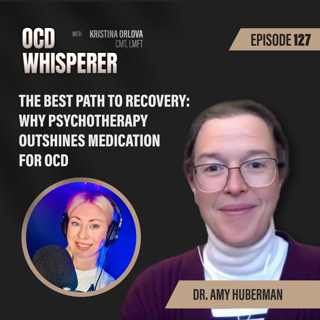
127. The Best Path to Recovery: Why Psychotherapy Outshines Medication for OCD
Did you know that many people with OCD still turn to medication as a first option, even though psychotherapy could be just as effective, if not more so? In this episode of The OCD Whisperer Podcast, host Kristina is joined by Dr. Amy Huberman, a psychiatrist specializing in OCD, anxiety, and trauma. Dr. Huberman discusses her journey from prescribing medication to focusing solely on psychotherapy as a way to treat OCD. In their conversation, Dr. Huberman shares how her initial belief in the necessity of medication shifted after observing the remarkable progress some patients made through intensive cognitive behavioral therapy (CBT). She describes how, during her residency at Johns Hopkins, she learned that OCD, anxiety, and depression were often treated with medication, but over time, she began to see the power of psychotherapy in helping patients regain their agency—allowing them to take control of their lives and symptoms. Dr. Huberman also opens up about her decision to stop prescribing medication and dedicate her practice to providing intensive psychotherapy. She reflects on the benefits and challenges of this decision, emphasizing that therapy, especially tailored CBT techniques, can have a profound and lasting impact on patients. This episode offers insight into a psychiatric professional's personal and professional journey toward providing more holistic and individualized care. Whether you're struggling with OCD yourself or working in the mental health field, this conversation is a deep dive into the evolving treatment options for OCD and anxiety. In This Episode [00:01:00] Meet Dr. Huberman [00:01:36] Medication debate [00:02:07] Dr. Huberman's decision to focus on psychotherapy. [00:02:48] Residency training influence [00:04:48] Experiencing recovery through therapy [00:05:47] Understanding agency [00:06:56] Realization about treatment [00:07:32] Pursuit of psychotherapy [00:08:34] Initial practice approach [00:10:21] Challenges with medication [00:12:04] Therapy's effectiveness [00:14:34] Pandemic impact on practice [00:16:07] Learning new approaches [00:16:37] Embracing psychotherapy [00:18:09] Understanding and acceptance [00:20:08] Key elements for self-acceptance [00:22:21] The paradoxical agenda-setting [00:23:03] Facing fears and self-identity [00:23:58] Finding Dr. Huberman [00:24:23] Closing remarks and resources Notable Quotes [00:02:48] "So I trained at Johns Hopkins, and there the message was very strong. Exactly what that person said in that comment is that everyone with OCD or anxiety disorders or depression should receive medication." - Dr. Amy Huberman [00:04:48] “I saw patients fully getting their lives back, really recovering in a sustained and full way, that was in the few months when I received some training in cognitive behavioral therapy.” - Dr. Amy Huberman [00:08:34] “So when I left residency and sort of started my own practice, I, you know, despite the fact that I was already so excited about psychotherapy and questioning a little bit, at least the message that I had taken away from my training of medication must always be a part of treating somebody with OCD or anxiety." - Dr. Amy Huberman [00:14:34] “The things that people were telling me was most helpful to them were not actually the medication pieces but the psychotherapy, which has honestly always been the part that I really loved about working with patients.” - Dr. Amy Huberman [00:21:38] “Understanding what our symptoms say about us, reveal about us, that's actually really important and positive.” - Dr. Amy Huberman [00:23:03] “When I hold a knife up to my loved one's neck and I don't do the thing that I think I'm going to do, that process itself can reveal, 'Oh right, this is actually the person I am, somebody who would never want to do that.'” - Dr. Amy Huberman Our Guest Dr. Amy Huberman, a skilled psychiatrist on the volunteer faculty at Johns Hopkins School of Medicine, brings her expertise to individuals through private practice in Maryland. Specializing in individually tailored psychotherapy and coaching, she focuses on treating OCD, anxiety, and trauma, offering a refreshing break from the traditional 15-minute session model. Dr. Huberman's approach is personalized and intensive, allowing for deep healing. While her psychotherapy services are available to those in Maryland, her coaching extends globally, empowering clients worldwide to overcome challenges and thrive. Resources & Links Kristina Orlova, LMFT https://www.instagram.com/ocdwhisperer/ https://www.youtube.com/c/OCDWhispererChannel https://www.korresults.com/ Dr. Amy Huberman https://www.amyhubermanmd.com/ Mentioned Sneaky Rituals with Jenna Overbaugh ICBT with Kristina Orlova and Christina Ennabe OCD CBT Journal Tracker and Planner Disclaimer Please note while our host is a licensed marriage and family therapist specializing in OCD and anxiety disorders in the state of California, this podcast is for educational purposes only and should not be considered a substitute for therapy. Stay tuned for biweekly episodes filled with valuable insights and tips for managing OCD and anxiety. And remember, keep going in the meantime. See you in the next episode!
21 Jan 25min
